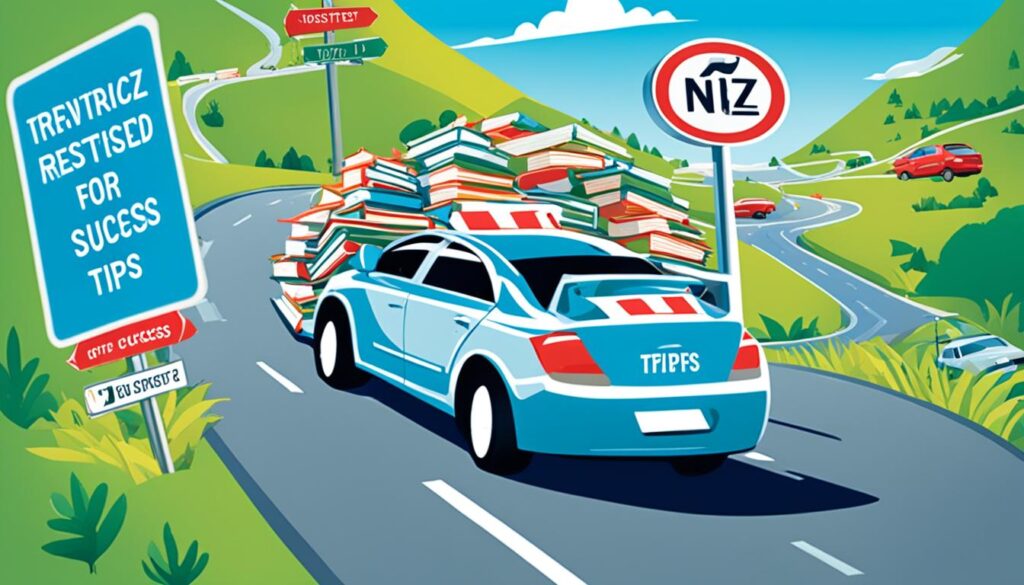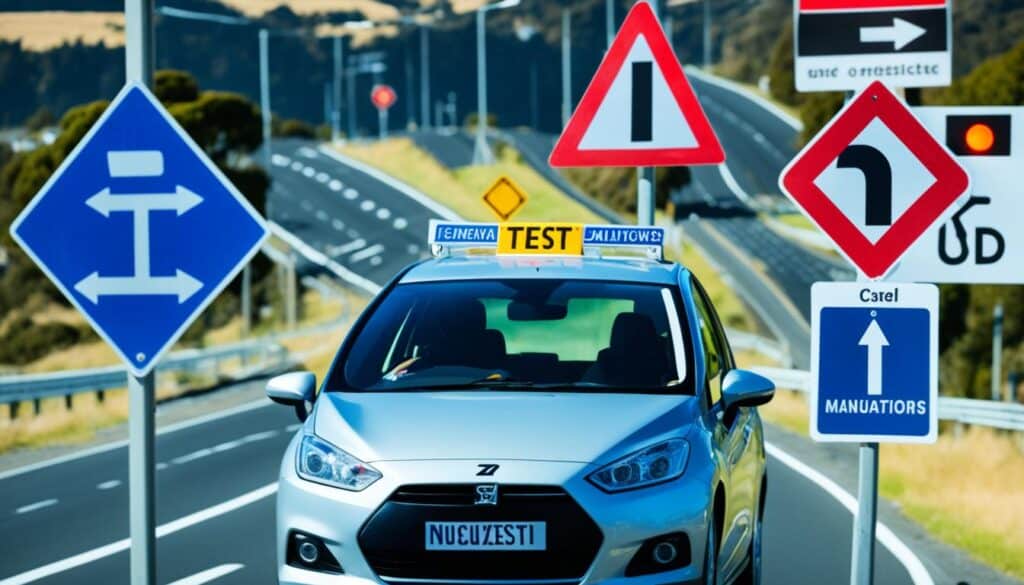Taking the NZ restricted test can be a daunting experience. Will I be well-prepared? Can I confidently navigate the challenging aspects of the test? These questions often plague aspiring drivers, but fear not! I’m here to provide you with valuable tips and strategies that will increase your chances of passing the test with flying colors.
Preparing for the NZ restricted test requires a multifaceted approach. It’s essential to study the official guide thoroughly, familiarize yourself with the road code, and seek advice and tips from experienced individuals. In addition, honing your driving skills with the guidance of a professional instructor can make all the difference.
But here’s where it gets interesting: Did you know that the timing of your test can impact your success? Is there an ideal time to take the test? Stay tuned, as we’ll delve deeper into this topic and uncover the best times to schedule your NZ restricted test.
Key Takeaways:
- Thoroughly study the official guide and review the road code to increase your knowledge and confidence.
- Seek advice and tips from experienced individuals, such as qualified driving instructors or online resources.
- Consider the timing of your NZ restricted test to avoid peak traffic hours and create a less stressful environment.
- Be prepared for the test at Sylvia Park Testing Station by familiarizing yourself with possible routes.
- Implement key strategies during the test, such as precise turning and good gap selection skills.
Best Times to Take the NZ Restricted Test
The timing of your NZ restricted test can play a crucial role in your success. To increase your chances of passing, it is advisable to choose the best times that are less crowded and more conducive to focused driving.
When scheduling your restricted test, avoid peak times when traffic is heavy and stressful. These peak periods typically occur before and after work or school, making it more challenging to navigate the roads calmly and confidently. By avoiding these times, you can minimize distractions and better concentrate on the tasks at hand.
Instead, consider opting for less congested periods, such as mid-morning or mid-afternoon. During these times, the roads tend to be quieter, providing a more relaxed and comfortable environment for your test. With fewer vehicles on the road, you can navigate intersections, roundabouts, and other driving scenarios with greater ease and clarity.
By selecting a time that is both convenient and less crowded, you can optimize your test-taking experience and improve your overall performance on the restricted test. Remember, a calm and focused mind is key to showcasing your driving skills and passing the test successfully.
Student Quote:
“I opted for a mid-morning slot for my restricted test, and it made a significant difference in my confidence. The roads were quieter, allowing me to concentrate better and perform at my best. I highly recommend choosing off-peak times for a more relaxed testing experience.”
– Emily, recent NZ restricted test passer
Choosing the best times to take your NZ restricted test can help create a less stressful and more focused environment. By avoiding peak times and opting for less congested periods, you can optimize your chances of performing well and passing the test successfully.
Importance of Thorough Study and Preparation
Proper study and preparation are essential for success on the NZ restricted test. Whether you’re a first-time test taker or retaking the exam, dedicating sufficient time to study is crucial. Simply relying on your existing knowledge isn’t enough – ensure you thoroughly study the guide and review the road code. By doing so, you can familiarize yourself with the rules, regulations, and best practices for safe driving on New Zealand roads.
One helpful strategy is to take detailed notes while studying. By jotting down key points, important road signs, and various driving scenarios, you can reinforce your learning and have a comprehensive reference material to consult whenever necessary.
Remember, passing the NZ restricted test isn’t just about obtaining a license – it’s about becoming a safe, careful, and confident driver. You’ll need to demonstrate your knowledge and ability to navigate different driving situations while prioritizing safety. Therefore, thorough study and preparation are essential steps in achieving your goal.
However, it’s also important to strike a balance between study time and other activities. Avoid overexerting yourself, as burnout can hinder your progress. Plan your study schedule effectively, allowing for breaks and leisure activities to maintain a fresh and focused mindset. By managing your time wisely, you can optimize your learning experience and ensure your preparation is both efficient and enjoyable.
Investing time and effort in studying and preparation is crucial to increase your chances of passing the NZ restricted test. Be proactive in seeking exam advice from experienced drivers who have successfully completed the test. Moreover, take advantage of online resources such as forums, blogs, and practice exams to further enhance your knowledge and understanding of the exam format.
Remember, success on the NZ restricted test is within your reach if you dedicate yourself to thorough study and preparation.
Personal Advice:
“During my own journey to obtain a restricted license, I discovered that consistency and practice were key. I set aside dedicated study time each day, focusing on understanding the road code and practicing the various maneuvers required in the test. By maintaining a positive mindset and gradually building my knowledge and skills, I gained the confidence I needed to pass the test with ease.”
Top Study Tips:
- Break down the study material into manageable sections and tackle them one at a time.
- Use mnemonic devices or visualization techniques to help memorize important information.
- Test your knowledge with practice questions or quizzes.
- Join online discussion forums to connect with other test takers and exchange valuable tips.

Tips for Taking the Test at Sylvia Park Testing Station
If you are taking the NZ restricted test at Sylvia Park Testing Station, it’s important to be aware of specific details that can help you feel more confident and prepared. One key aspect to consider is the possible routes that the test may take at Sylvia Park. Familiarizing yourself with these routes can give you an advantage during the test.
Here is a list of possible roads that may be included in the test route at Sylvia Park:
| Roads |
|---|
| Panama Road |
| Carbine Road |
| Clemow Drive |
| Waipuna Road |
| Peterson Road |
| The South-Eastern Highway |
| Vestey Drive |
| Great South Road |
While these roads are commonly included in the test route, it’s important to note that new routes may be introduced. Therefore, it’s crucial to be prepared for any route.
To gain a better understanding of the possible routes at Sylvia Park Testing Station, you can visit the following website: https://www.practice.co.nz/pass-planner/starting-out/vehicle-controls/getting-ready.aspx. This resource will provide you with insights into specific roads and junctions that you may encounter during the test.
Quote:
I studied the possible routes at Sylvia Park Testing Station and it helped me feel more confident during the NZ restricted test. Being prepared for any route is key to success. – (Your Name)
By researching the possible routes and studying the specific roads in the area, you can enhance your familiarity with the test route at Sylvia Park. This knowledge will enable you to navigate the test with more ease and confidence, increasing your chances of success.
Key Strategies for Passing the NZ Restricted Test
When it comes to passing the NZ restricted test, studying and preparation are essential. However, there are also key strategies you can implement to improve your chances of success.
- Confidence in Give Way Rules: Make sure you fully understand and are confident in your knowledge of give way rules. This includes knowing who has the right of way in different situations and being able to apply these rules correctly during the test.
- Practice Different Roundabouts and Intersections: Familiarize yourself with various types of roundabouts and intersections. Practice navigating them correctly, paying attention to lane positioning, signaling, and yielding to other vehicles.
- Develop Gap Selection Skills: Being able to select and assess gaps accurately is crucial for safe driving. During your practice sessions, focus on judging distances and speeds of approaching vehicles to make confident and timely decisions.
- Be Precise with Turning: When making turns, be precise in your maneuvers, especially when it comes to staying within your designated lane. Avoid cutting corners to demonstrate your ability to execute turns accurately.
- Maintain Awareness of Traffic Lights and Intersections: Stay alert and aware of traffic lights and intersections during the test. Understand the different phases of traffic lights and know when to stop, yield, or proceed cautiously. Follow proper procedures for approaching and navigating intersections.
By implementing these key strategies and practicing them consistently during your driving lessons and practice sessions, you can build confidence and improve your overall performance on the NZ restricted test.
Expert Tip:
Remember, passing the NZ restricted driving test is not just about obtaining a license; it’s about becoming a safe and responsible driver. Focus on developing a strong foundation of driving skills and knowledge that will serve you well beyond the test.
Advice for Test Day
On the day of your NZ restricted test, there are certain things you can do to set yourself up for success.
- Eat a good meal: Before the test, it is important to fuel your body with a nutritious meal. This will provide you with the energy and concentration you need to perform your best.
- Check the news and weather forecast: Staying updated on the latest news and weather conditions can help you plan your route accordingly. Adjusting your driving based on the weather and road conditions will contribute to a safer and more successful test.
- Mentally prepare yourself: Take some time before the test to mentally prepare yourself. Visualize yourself confidently completing each task and remind yourself of the skills you have acquired during your preparation. Stay positive and focus on the task at hand.
- Remain calm: It is natural to feel nervous before a test, but try to stay calm throughout the process. Take slow, deep breaths to help relax your body and mind. Remember that you have prepared for this moment and have the necessary skills to succeed.
- Perform pre-drive checks: Before getting in the car, make sure to perform pre-drive checks to ensure that your vehicle is in good working condition. Check the tires, lights, brakes, and other key components. This will help you avoid any potential issues during the test.
By following these test day tips and personal advice, you can approach the NZ restricted test with confidence, focus, and preparedness. Good luck!

The Role of Parents in Teen Driver Safety
As a parent, you have a crucial responsibility when it comes to the safety and success of your teen drivers. Your involvement and guidance throughout their learning process can make a significant difference. By actively participating in their driving education, you can help them develop essential skills and instill responsible driving habits.
One of the most important aspects of your role as a parent is to encourage open communication with your teenage drivers. Make sure they feel comfortable discussing their experiences, concerns, and questions with you. This ongoing dialogue will allow you to provide them with appropriate advice, support, and reassurance.
In addition to communication, being available for assistance at any time is paramount. Your teenagers need to know that they can rely on you when they are facing challenges or uncertainties on the road. Whether it’s troubleshooting a specific driving maneuver or seeking guidance in difficult situations, your presence will give them the confidence and security they need.
Leading by example is another essential element of your parental role. As a driver, always exhibit good driving habits and adhere to the rules and restrictions of the restricted license. Your behaviors and choices behind the wheel will influence your teenagers’ attitudes and actions while driving. By consistently demonstrating safe and responsible driving, you demonstrate the importance of these behaviors to your teenagers.
“The best way to teach your children good driving habits is by practicing them yourself.”
Creating a safe learning environment is crucial for your teen drivers’ progress. This includes providing them with adequate driving practice opportunities with your supervision. By gradually exposing them to various road conditions, traffic volumes, and challenging driving scenarios, you can help them build confidence and improve their skills.
Remember, parental involvement doesn’t end once your teenagers have obtained their restricted licenses. Continuously staying engaged and offering guidance as they gain more experience on the road is essential. By regularly reviewing driving skills, discussing potential risks and hazards, and encouraging ongoing education, you can help them navigate the complexities of driving safely throughout their lives.
Conclusion
Successfully passing the NZ restricted test requires diligent study, thorough preparation, and ample practice. By following the insightful advice and effective strategies mentioned throughout this article, you can significantly increase your chances of achieving success. Make use of resources such as experienced driving instructors and comprehensive online guides to enhance your knowledge and skills.
Throughout the test, it is crucial to maintain confidence, remain focused, and prioritize safety. Adhering to the recommended tips for mirror checking, stop signs, pedestrian crossings, parallel parking, turning, and traffic lights will help you showcase your proficiency and demonstrate your understanding of road rules.
Moreover, parents play a vital role in their teen’s driving education. By actively participating, offering guidance, and providing unwavering support, parents can help their young drivers develop the necessary skills and responsible habits to ensure a safer driving experience.
By combining thorough preparation, consistent practice, and strong parental involvement, you will unlock the key to success for your NZ restricted test. As you embark on your driving journey, remember to prioritize safety, exhibit good driving habits, and always stay informed about road regulations. Congratulations on your determination and commitment to becoming a skilled and responsible driver in New Zealand!




